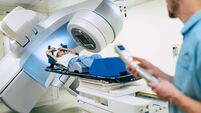Gareth O'Callaghan: My wife’s cancer battle opened my eyes to another disease in Ireland: hate
Within a few days of the diagnosis, it dawned on me that I was now the husband of a cancer patient. My heart was breaking for her. File photo
Life has an uncanny way of reminding you that all you have ever learned and succeeded in achieving will never prepare you for what you have no control over, until it happens — whatever ‘it’ might be.
‘It’ happened to us one afternoon last December. Cork City traffic was typically heavy. I had just dropped my wife Paula close to the main entrance of the hospital for what we hoped was a normal review of some routine blood tests. In the time it took me to find a place to park, she was told she had leukaemia.















